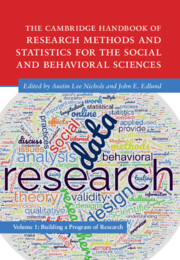 The Cambridge Handbook of Research Methods and Statistics for the Social and Behavioral Sciences
The Cambridge Handbook of Research Methods and Statistics for the Social and Behavioral Sciences Book contents
- The Cambridge Handbook of Research Methods and Statistics for the Social and Behavioral Sciences
- Cambridge Handbooks in Psychology
- The Cambridge Handbook of Research Methods and Statistics for the Social and Behavioral Sciences
- Copyright page
- Dedication
- Contents
- Figures
- Tables
- Contributors
- Preface
- Part I From Idea to Reality: The Basics of Research
- 1 Promises and Pitfalls of Theory
- 2 Research Ethics for the Social and Behavioral Sciences
- 3 Getting Good Ideas and Making the Most of Them
- 4 Literature Review
- 5 Choosing a Research Design
- 6 Building the Study
- 7 Analyzing Data
- 8 Writing the Paper
- Part II The Building Blocks of a Study
- Part III Data Collection
- Part IV Statistical Approaches
- Part V Tips for a Successful Research Career
- Index
- References
3 - Getting Good Ideas and Making the Most of Them
from Part I - From Idea to Reality: The Basics of Research
Published online by Cambridge University Press: 25 May 2023
- The Cambridge Handbook of Research Methods and Statistics for the Social and Behavioral Sciences
- Cambridge Handbooks in Psychology
- The Cambridge Handbook of Research Methods and Statistics for the Social and Behavioral Sciences
- Copyright page
- Dedication
- Contents
- Figures
- Tables
- Contributors
- Preface
- Part I From Idea to Reality: The Basics of Research
- 1 Promises and Pitfalls of Theory
- 2 Research Ethics for the Social and Behavioral Sciences
- 3 Getting Good Ideas and Making the Most of Them
- 4 Literature Review
- 5 Choosing a Research Design
- 6 Building the Study
- 7 Analyzing Data
- 8 Writing the Paper
- Part II The Building Blocks of a Study
- Part III Data Collection
- Part IV Statistical Approaches
- Part V Tips for a Successful Research Career
- Index
- References
Summary
Good research ideas and hypotheses do not just magically exist, begging to be tested; they must be discovered and nurtured. Systematic methods can help. Drawing on relevant scholarly literatures (e.g., research on creativity) and on the published personal reflections of successful scientists, this chapter provides an overview of strategies that can help researchers to (1) gather research ideas in the first place, (2) figure out whether an idea is worth working on, and (3) transform a promising idea into a rigorous scientific hypothesis. In doing so, it provides pragmatic advice about how to get good ideas and make the most of them.
- Type
- Chapter
- Information
- The Cambridge Handbook of Research Methods and Statistics for the Social and Behavioral SciencesVolume 1: Building a Program of Research, pp. 47 - 64Publisher: Cambridge University PressPrint publication year: 2023
